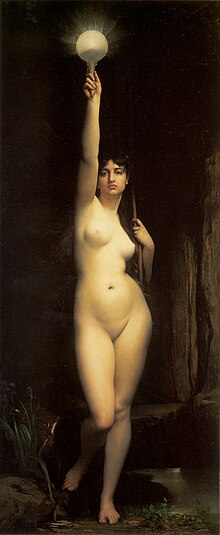Areopagitica
Appearance

Areopagitica: A speech of Mr John Milton for the liberty of unlicenced printing to the Parliament of England is a prose tract by John Milton, published 23 November 1644.
Quotes
[edit]
- Books are not absolutely dead things, but do contain a potency of life in them to be as active as that soul was whose progeny they are; nay, they do preserve as in a vial the purest efficacy and extraction of that living intellect that bred them. I know they are as lively, and as vigorously productive, as those fabulous dragon's teeth; and being sown up and down, may chance to spring up armed men. And yet, on the other hand, unless wariness be used, as good almost kill a man as kill a good book. Who kills a man kills a reasonable creature, God's image; but he who destroys a good book, kills reason itself, kills the image of God, as it were in the eye. Many a man lives a burden to the earth; but a good book is the precious life-blood of a master spirit, embalmed and treasured up on purpose to a life beyond life. 'Tis true, no age can restore a life, whereof perhaps there is no great loss; and revolutions of ages do not oft recover the loss of a rejected truth, for the want of which whole nations fare the worse.
- A man may be a heretic in the truth, and if he believe things only because his pastor says so, or the assembly so determines, without knowing other reason, though his belief be true, yet the very truth he holds becomes his heresy.
- Seasoned life of man preserved and stored up in books.
- I cannot praise a fugitive and cloistered virtue, unexercised and unbreathed, that never sallies out and sees her adversary, but slinks out of the race where that immortal garland is to be run for, not without dust and heat.
- Where there is much desire to learn, here of necessity will be much arguing, much writing, many opinions; for opinion in good men is but knowledge in the making.
- Who shall silence all the airs and madrigals that whisper softness in chambers?
- Methinks I see in my mind a noble and puissant nation rousing herself like a strong man after sleep, and shaking her invincible locks. Methinks I see her as an eagle mewing her mighty youth, and kindling her undazzled eyes at the full midday beam.
- Give me the liberty to know, to utter, and to argue freely according to conscience, above all liberties.
- Though all the winds of doctrine were let loose to play upon the earth, so Truth be in the field, we do injuriously, by licensing and prohibiting, to misdoubt her strength. Let her and Falsehood grapple; who ever knew Truth put to the worse, in a free and open encounter?
- Comparable with statement of Thomas Jefferson in his First Inaugural Address (4 March 1801): "Error of opinion may be tolerated where reason is left free to combat it."
- We should be wary therefore what persecution we raise against the living labours of public men, how we spill that seasoned life of man, preserved and stored up in books; since we see a kind of homicide may be thus committed, sometimes a martyrdom, and if it extend to the whole impression, a kind of massacre; whereof the execution ends not in the slaying of an elemental life, but strikes at that ethereal and fifth essence, the breath of reason itself, slays an immortality rather than a life.
- Truth and understanding are not such wares as to be monopolized and traded in by tickets and statutes and standards. We must not think to make a staple commodity of all the knowledge in the land, to mark and license it like our broadcloth and our woolpacks.
- There is yet behind of what I purposed to lay open, the incredible loss and detriment that this plot of licensing puts us to; more than if some enemy at sea should stop up all our havens and ports and creeks, it hinders and retards the importation of our richest merchandise, truth.
- He who thinks we are to pitch our tent here, and have attained the utmost prospect of reformation that the mortal glass wherein we contemplate can show us, till we come to beatific vision, that man by this very opinion declares that he is yet far short of truth.
- It is not possible for man to sever the wheat from the tares, the good fish from the other fry; that must be the Angels' ministry at the end of mortal things. Yet if all cannot be of one mind — as who looks they should be? — this doubtless is more wholesome, more prudent, and more Christian, that many be tolerated, rather than all compelled.

